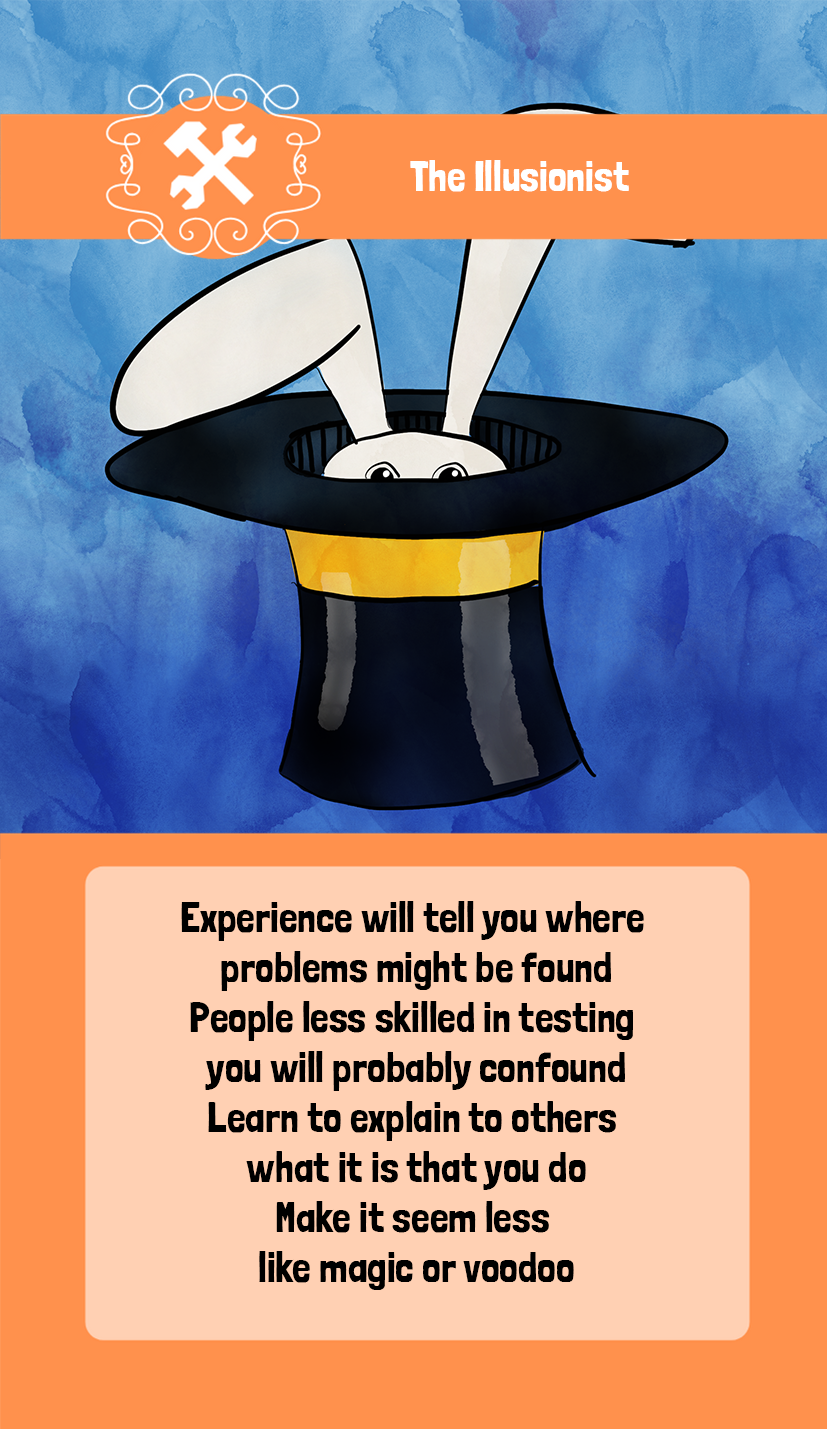
And last post of the week if of course a tool, a super power if you will. I am excited about this one and I have some great reading suggestions to share. First of all, the rhyme:
”Experience will tell you where problems might be found
People less skilled in testing you will probably confound
Learn to explain to others what it is that you do
Make it seem less like magic or voodoo”
So, what does it mean?
This card deals with something a lot of us are not taught: How to actually articulate and communicate what we are doing and why.
”They are just clicking around in the system!”
”How did you find that? That is so random!”
”I don’t know how she does it. It’s like she magically knows where the bugs are”
Heard it before? Hm?
Or the other side of the coin, have you ever been asked how you came up with a certain idea but you don’t know? Maybe you just did whatever came to mind at the moment?
Well, I am sure some bugs are found purely by luck. I am also sure a lot of what we, and others, think is luck is actually experience. Thirdly, I am sure learning how to talk about the reasoning behind decisions and actions is a very important skill to learn.
(It is also one of the reasons behind this card game and these blog posts so it’s kind of a given that I think it’s important )
Talking about your actions force you to think about them. Thinking about them means you become aware of the reasons behind them. Becoming aware of your reasons allow you to see where you are stronger and where you could improve. It also is great for teaching others of course!
Before I had to explain why I did certain things I never noticed how I always tended to prefer a certain set of tests for everything I did. Which in turn showed me the big gaping holes in my testing.
I also never understood that a lot of my programming and hardware knowledge influenced my testing heavily, which is why I found a lot of stuff other testers didn’t.
And a third benefit was that when I started talking about what I did, and why, the developers learned my patterns and they got better at catching bugs themselves. Win-Win!
There are many ways of doing this. Pair up with someone, keep a testing diary, walk through your testing with someone afterwards. Have someone else explain their testing to you. You can learn so much!
Story time
You will get no story today. Instead I would like to ask you to tell me your own stories.
Have you experienced this?
Have you tried it? What results did you get?
Please, share your stories with me!
Quote of the day
”If we can talk about what we’re doing when we’re testing, then we can improve.
Alex Schladebeck
We can teach others how to become better testers.
We can also recognise when a new method/technology/approach is missing something that exploratory testing can give us.”
Reading suggestions
Microheuristics – Alex Schladebeck
You´ve got to see this – Gurock
Testing story – Developsense
Eplore with intent – Maaret Pyhäjärvi
Testopsies – James Bach and Michael Bolton
Agile testing, More Agile Testing, Agile Testing Condensed – Janet Gregory, Lisa Crispin
Explore it! – Elisabeth Hendrikson
Previous posts in the series
| Title and link | Category |
| Part 1: Introduction | None |
| Part 2: Mischievous Misconceptions | Trap |
| Part 3: The Rift | Weapon |
| Part 4: The Fascade | Tool |
| Part 5: The Temptress’ Trails | Trap |
| Part 6: Allies | Weapon |
| Part 7: Don’t turn back | Tool |
| Part 8: The Glutton | Trap |
| Part 9: Beyond the border | Weapon |
| Part 10: Forever and never | Tool |
| Part 11: The Shallows | Trap |
| Part 12: The Twins | Weapon |
| Part 13: The Observer | Tool |
| Part 14: Alethephobia | Trap |
| Part 15: Opus interruptus | Weapon |